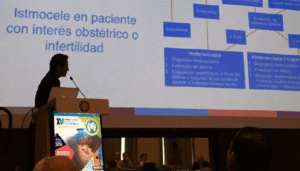Although it is not considered infertility, losing pregnancies repeatedly generates as much or even more frustration.
This diagnosis, known as Recurrent Pregnancy Loss (ERP), is made in couples who have lost 3 or more pregnancies. The risk of a new loss is greatly increased and measures must be taken to prevent this from occurring. PRE occurs in about 3% of couples. In general, these losses occur in the first half of pregnancy, before 20 weeks.
Recurrent Pregnancy Loss is associated with multiple causes:
- Genetic. There may be alterations in the chromosomes of the parents that are not manifested in their physical characteristics, but that predispose them to form embryos with genetic alterations incompatible with life, which result in an early abortion. The most common of these is known as translocations, in which a piece of one chromosome breaks off and sticks to another chromosome.
- Uterine. A woman may have alterations in her uterus that hinder the normal development of the placenta and pregnancy. This can be from birth (Mullerian malformations) such as septa that separate the cavity of the uterus in two and uteruses with 2 separate bodies or acquired defects such as the growth of uterine tumors called fibroids or polyps, among others. The inability of the cervix to contain pregnancy can also cause recurrent leakage during the second trimester of pregnancy.
- Immunological. The immune system, which normally produces proteins known as antibodies, which attack and destroy foreign agents to the body such as bacteria, fungi and viruses, suffers an imbalance and begins to produce antibodies against the body’s own components. In some cases, these components are structures known as phospholipids, which are involved in regulating blood clotting. Its presence generates a state of hypercoagulability of the blood that causes the formation of small thrombi in the placenta and recurrent pregnancy loss. This is known as antiphospholipid syndrome.
- Endocrine. Some pathologies that have to do with the alteration in the production of hormones in the body can generate recurrent pregnancy losses. Those with a clearer association are thyroid disorders, diabetes, alteration in prolactin secretion and a decrease in the ovary’s ability to produce progesterone, in what is known as corpus luteum deficiency.
- Infectious. Some infections, mainly viral, can lead to isolated pregnancy loss. However, it is not proven that any of them generate recurrent pregnancy losses.
Many other alterations have been correlated with ERP, however few have enough medical evidence to support them and only those mentioned above deserve to be considered within the study of couples suffering from this condition.
After a complete study in couples with PRE, an obvious cause is found in 50% of couples. In the remaining 50% there is no cause, in what is known as idiopathic PRE. Most of the causes mentioned are likely to be successfully managed, through different types of treatments such as the correction and control of hormonal disorders, the use of medicines to reduce the tendency to form clots in the blood, surgical correction of uterine disorders, early supplementation in pregnancy with exogenous progesterone and/or the use of in vitro fertilization with genetic analysis of the embryos before transferring them to the uterus. In cases of idiopathic PRE, even if no cause is detected, the prognosis of these couples is very good since medical evidence has shown that up to 80% of them manage to have a full-term baby without being subjected to any type of medical treatment.
As you can see, PRE is a condition that generates deep emotional difficulties but thanks to scientific medical development, today it has a good chance of being successfully faced. These couples, although they face a huge sense of frustration, have an excellent chance of becoming parents with adequate medical management.
inSer Group.

